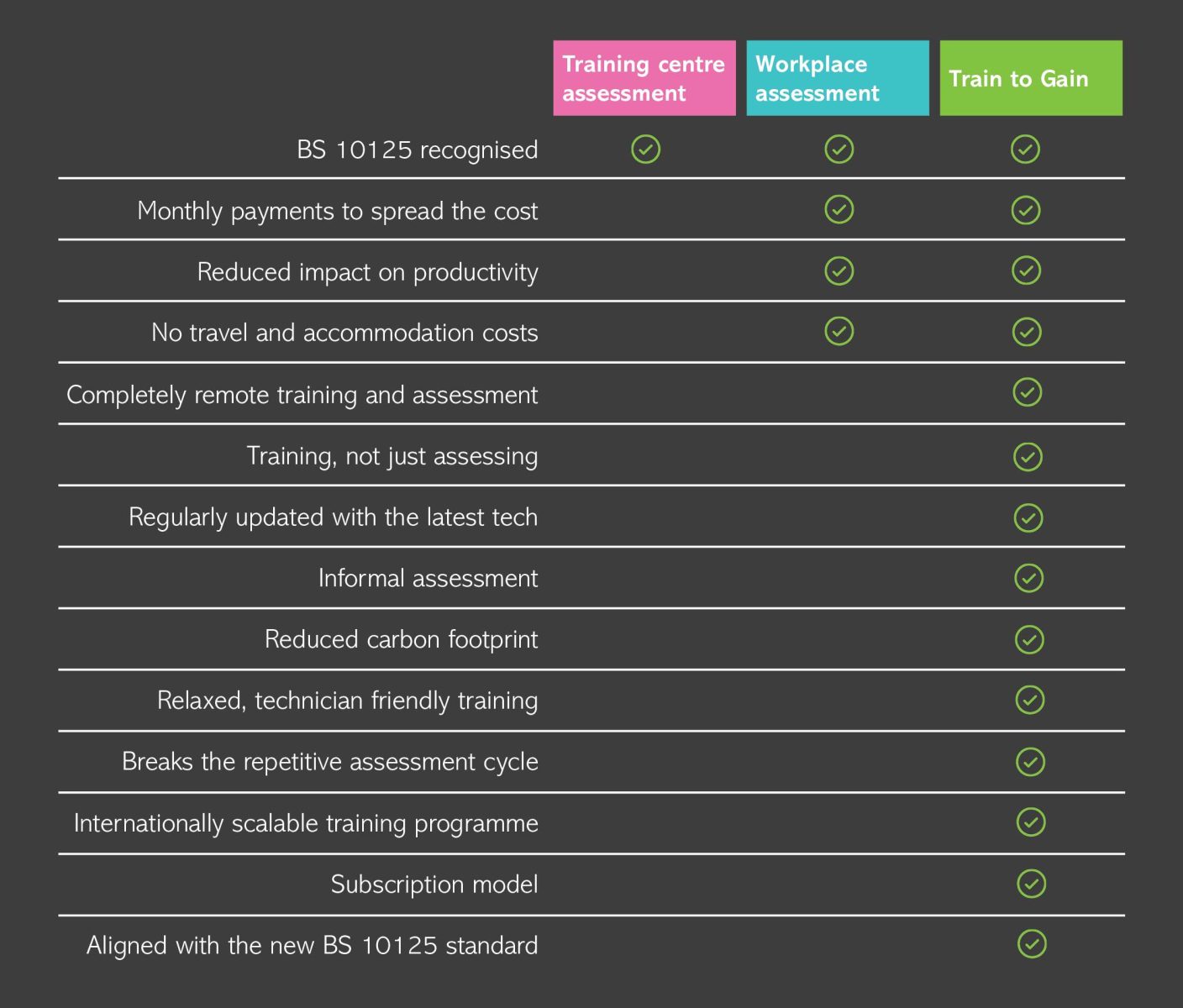The future of BS 10125 compliance
Train to gain
Not yet registered? Contact us today
train to gain
In today’s rapidly evolving automotive repair industry, maintaining BS 10125 compliance is not just a necessity – it’s an opportunity to elevate your team’s expertise and future-proof your business. Introducing Train to Gain, RWC Training’s groundbreaking Continuous Professional Development (CPD) programme meticulously designed to move beyond traditional reaccreditation.
Unlike conventional methods that often involve repetitive assessments, Train to Gain represents the future of compliance and training – a holistic approach that not only ensures you meet BS 10125 standards, but also empowers your team with increased skills and up-to-date knowledge.


Experience the Train to Gain advantage
- Complete remote training and assessment
- Fresh content every three years, replacing repetitive assessments
- Eliminate travel and accommodation costs
- No on-site assessor visits
- Technician-friendly training that boosts confidence
- Minimal downtime and increased productivity
- Highly skilled technicians with regular technology updates
- National consistency and standardisation
- Flexible payments with subscription model
- Same investment but with even more results
The path to BS 10125 compliance and skill development
The CPD programme is built around C units structured around core skills – such as panel, paint and MET. They directly map to specific job roles and align with the BS 10125 audit procedure. Assessment of each role’s C units is spread across the three years, similar to traditional reaccreditations, with different topics addressed each year.
Once enrolled, delegates will participate in engaging online sessions led by a Train to Gain instructor. These aren’t typical passive webinars; our sessions are highly interactive, incorporating demonstration videos, insightful interviews with industry professionals, dynamic group discussions and more. To ensure genuine understanding and knowledge retention, short assessments are integrated throughout each session.
To validate practical skills, some courses require a video submission showcasing the correct application of learned techniques. We provide clear guidance and a demo video to make this as easy as possible. These skills validation videos are only needed once every three years to demonstrate expertise.

Stop assessing, and train
The CPD programme has been developed by a sector advisory group of leading repair industry organisations, including the IMI. Train to Gain has embraced this and answers the call to “stop assessing and train,” offering a dynamic and engaging pathway to compliance that simultaneously cultivates your technicians’ skills and knowledge.
This isn’t just reassessment to remain compliant; it’s a strategic investment in your team’s capabilities. For the same cost as traditional reaccreditation, Train to Gain actively upskills your workforce, keeping them abreast of evolving technologies and best practices.
Delivered entirely remotely, our programme eliminates the significant costs and disruptions associated with traditional training, including travel, accommodation and extensive downtime. Your technicians can learn and develop without leaving the workshop, minimising loss of productivity and maximising their learning potential.
Cost-effective compliance and training with Train to Gain
Train to Gain delivers a cost-effective solution for BS 10125 compliance and enhanced skills development. Our programme’s pricing is straightforward: £650 for the core units and £325 for add on units.
Below is a detailed cost comparison between RWC Training’s Train to Gain programme and traditional reaccreditation methods for an example MET technician, highlighting the significant value and potential savings offered by our innovative approach.
Direct training cost savings: As shown in the table, Train to Gain can save you up to £1,232 for this example technician
Flexible payment structure: Costs are spread across the three years of enrolment and paid monthly in one invoice for all delegates, simplifying budgeting
Eliminate travel and accommodation: Train to Gain’s remote delivery eliminates the significant expenses associated with travel and accommodation for your technicians
Minimise downtime: Reduce disruption to your workshop schedule, minimising productivity loss
Volume based discount: Tiered model to benefit from discounts as your business grows or increase unit bookings
How does Train to Gain compare to the current assessment model?
BS 10125 accepts qualifications from two awarding bodies: IMI and City & Guilds. Traditionally, IMI requires delegates to attend an approved centre for assessment, while City & Guilds allows on-site assessment by an assessor. This new CPD model enables both workplace and remote training delivery to be utilised.
Ultimately, Train to Gain offers a more flexible and less disruptive approach to maintaining BS10125 compliance compared to the traditional assessment models.
